Choosing the right microphone for your home studio can be a daunting task - especially when you're on a budget. Should you buy a condensor or a dynamic? What brand? What model? Ultimately the goal is to get the best vocal sound you can in the space you have, so depending on your room treatment (if any), the style of music you record and the sound you're going for, your choice will be unique to your needs. No matter what kind of mic is your favorite, you're bound to have situations where a different mic would work better. If you can, pick up as many different mics you can and over time you'll build a nice collection that's capable of capturing the same sound numberous different ways. To make your job easier in picking your first, or maybe just your next microphone, we've put together a short list of mics (some you wouldn't expect) that we think work great in a home studio environment and cost less than $500.
Before we get into specific models of micriophones, its important to understand the difference between condensor mics and dynamic mics. Each have their strengths and weaknesses and provide very different sounds. Its generally a good idea to have at least one of each if you can - especially if you record people other than yourself. Different voices will sound better on one than another. For instance a strong rock vocal might sound great on a dynamic mic, but too crisp on a condensor.
Condensor mics are very common in studios and are extremely popular with Rop, R&B and Rap artists. This is especially true in studios with treated rooms. Condensor mics have a much greater frequency response than dyanmic mics so they produce very clear, crisp sound. Top of the line condensors have been used in major studios for decades and can produce fantastic results if used correctly. One of the most common problems with condensor mics, though, is the amount of background noise they pick up in an untreated space. If you are recording in a bedroom or live by a highway, condensor microphones are probably going to pick up too much transient sound to give you a clean recording. With that said, all things are possible. Condensor mics require phantom power and some even require an external power supply, but if you have a nice treated space they can make all the difference in your vocal sounds.
Dynamic mics are generally less expensive than condensor mics of the same caliber. Dynamic mics do not require phantom power and have a lower frequency response than condensors. This means you can get a lot more isolated vocal sound from a dynamic mic in an untreated or poorly treated room. One thing to note about dynamic mics is that for some models you need quite a bit of gain in your preamp to make them shine. Dynamic mics have been used on tons of studio albums as well and work really well for hip-hop, alternative rock and spoken word.
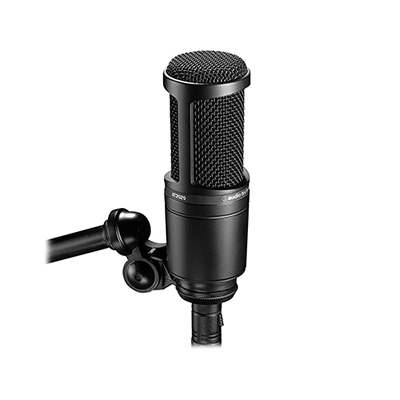
The AT2020 is a great starter mic for a home studio. It features a high pass filter, a 10db pad and a cardiod pattern and is one of the best mics in its price range.
Features
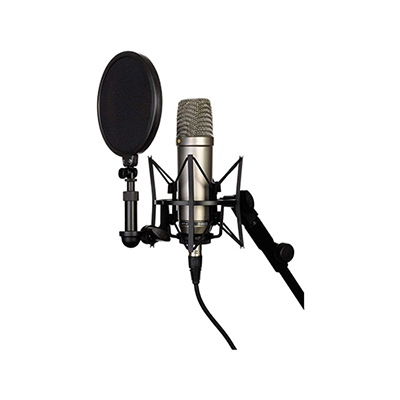
Rode has a great reputation for creating high quality mics at affordable prices. It comes bundled with a pop filter, shockmount, microphone dust cover, mic cable and a bonus instructional DVD. This mic has been a standard in home studios since 1995 and is definitely a good place to spend your money if you are in the market for a condensor with low background noise and are in need of some accessories to go with it.
Features
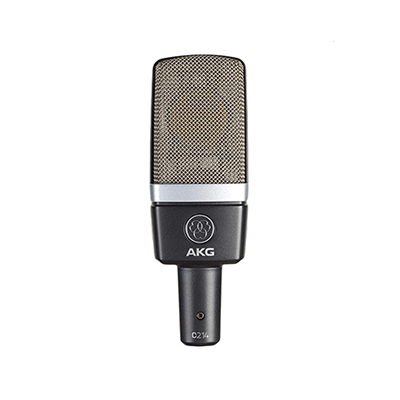
The AKG C214 has the same dual capsule as the C414 (its more expensive older brother). The C414 is a standard in professional studios around the world but it will run you about $1000, so the C214 is a good second choice if you are working on a budget. Unlike some other condensors, this mic doesn't have switchable patterns, so you'll only be able to use the single pattern, but, while it seems like you get less, you actually get a killer sounding mice at a reasonable price.
Features
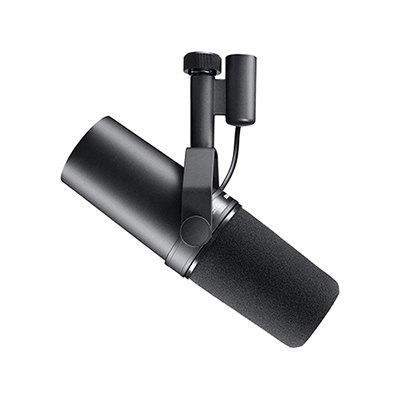
Ok so if you have the $349 to drop on this mic, you should. There's almost no point in continuing the list after this one. The SM7B is a broadcast microphone that has been used on countless professional albums. Because it is dynamic, it picks up very little room noise but still delivers a crisp. clear sound. The downside to this mic is that it requires a ton of gain (up to 60-70db!), so you'll need a preamp with a lot of gain to get it to sound its best. Many people swear by the Neve 1073 preamps with this mic, but if thats out of your price range have a look at a Golden Age Project Pre-73 MKIII or a CloudLifter.
Features
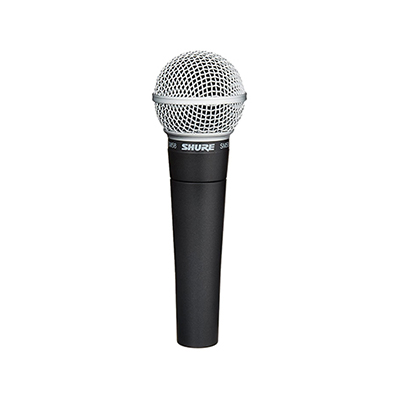
If the SM7B is a little outside your budget, have no fear! The SM58 has long been known as a road mic for use at live shows. It is the most durable mic I've ever used and will take just about any abuse you throw at it. So why is it on this list you ask? Well, the SM58 is actually a pretty similar design to the SM7B and, although it won't give you quite the same sound, its really close when you run it through a preamp. Also, the SM58 doesn't require nearly as much gain as the SM7B, so you can get away with running it through just about any preamp. Keep in mind, you'll probably want to throw a little more aggressive high pass filter on your vocal tracks if you go this route to get rid of some of the muddy frequencies this mic picks up.
Features
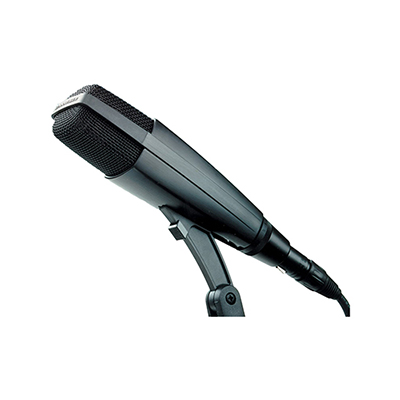
The MD421 II, while not generally considered a vocal mic, actually holds its own in the vocal booth. This mic is known as one of the most versatile and best "all around" mics out there. If you're recording more than just vocals with your mic, you might want to check this one out since it will do a great job on vocals, acoustic guitar and even drums. The 5-position bass control gives you the ability to get the sounds you want in just about any situation.
Features
To be honest, all of these mics are winners. Pick up as many as you can to give you more options on the way you capture sounds in your studio. The best thing you can do to decide where to start is to try them out at a local music store or borrow one from a friend. If I had to pick, I'd choose the Shure SM7b for a dynamic or the AKG C214 for a condensor. Regardless of what you choose, though, remember - your performance and your mix are ultimately much more important than the equipment you use or your room treatment.